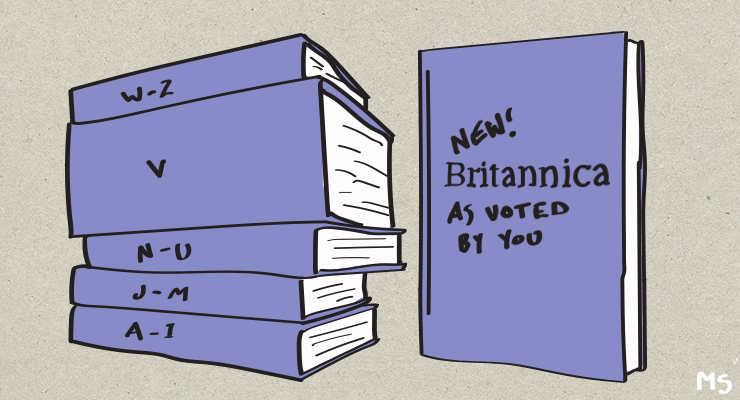
In the mid-’90s, when my geeky partner was snaffling a domain using my surname and trying to convince me of all the ways the internet would liberate me from the most mundane aspects of my academic and journalistic endeavours, I was a sceptic.
Not because I couldn’t use the technology; I’m old enough to remember the basic commands required to drive DOS. My worry was about quality control: “If anyone can post anything on it, how do you know what to trust?”
His answer was confident and, at the dawn of a new era in information verification, unvexed by reality: “The algorithm. It’ll push what’s best to the top, and what’s rubbish further down.”
Now, a quarter of a century later, the problem in this answer is plain for all to see: just because something is popular, that doesn’t make it right or true.
Majorities used to think that the sun circled the earth, racial enslavement was a good idea, and women shouldn’t study at university because it would shrivel their uteruses. A majority supported the legal fiction of terra nullius and heiled Hitler. The very last thing majorities are known for are considered or informed judgments about anything, particularly once they coalesce — in person or online — into mobs.
Yet the information production system on which we all rely is based on mob rule. The algorithms used to search the web deliver results substantially based on what is often referred to as “the wisdom of crowds”. Namely, the degree to which other sites and users have engaged with the content.
There’s nothing wrong with filtering for popularity if you’re looking for a good movie or the best place to eat on Saturday night. But asking an information system optimised for popularity to reliably tell you whether Jews are plotting global domination, if vaginoplasty is required, or even what a famous person does if they’re currently mired in controversy is a category mistake. The results are nothing more than the racist, misogynistic and cancellation cries of the crowd.
It didn’t have to be this way. Before “monetising engagement” was all anyone cared about on the web, the concept of “search” could have been bifurcated. Rather than crowds being deemed the suitable arbiter of everything, their views could have been privileged and dismissed in precisely the way post-enlightenment cultures took centuries to perfect.
At the same time, the fascinating project of finding algorithmic ways of recognising truth and credibility could have been pursued, so that users searching the internet would have had a choice. Did they want search results that privilege the truth, or just what’s popular?
Instead we’ve been left with the web equivalent of the idiot box. A unitary search mechanism that produces results capable of satisfying only the most banal of human yearnings — not for the truth, or for challenging arguments based on facts, but to know what the pack is doing to stay in step and keep out of trouble.








A nice little piece, Leslie, with which I could not agree more (and have already shared a couple of times).
Between monetising the web and allowing governments to seize control, its vast potential for good has been throttled.
Thanks Gus!
I have never been within cooee of unsocial media but, over the last 6 months, I have found googling real questions – facts, events, references etc – has been returning more & more frequently the most banal & trivial results.
It is often necessary, as with avoiding the mod here, to exclude certain common terms as they lead to who is doing whom garbage.
The information superhighway has become a potholed Sunset Strip, all glitz & tawdry glamour, crawling with hookers, crook & creeps.
use another search engine its free choice and you get different answers
Not much free choice when I tried duck*uck last year – it included porn attached to normal words so dropped it.
My duck2go came pre installed with the porn blocker working which i thought was a bonus.
Is that a new version? I’m so sick of the banality of google results that I’d welcome an alternative.
I’m currently using the new Ghostery Dawn which does not accept paid ads and so far, Day 3, it’s performing well.
D2go for iPad v7.68.6.0
We could discuss the embarrassment that is Amber Heard frinstance.
There are truisms that, increasingly, aren’t grounded in fact anymore because it doesn’t comply with the agenda.
Right girls ?
Which side are you talking about?
Since none of us has ever met either Johnny Depp or Amber Heard in person, absolutely everything we know about that relationship is something that a person somewhere decided that they want to persuade us of. None of it is unbiased first-hand knowledge.
I try to have zero opinions on Depp v Heard. So far so good!
I think the presented evidence is out there for those who are prepared to accept what isn’t acceptable these days
Leslie
I search with duckduckgo search engine and guess what, I get different anwers to google. Most are not aware that who pays the most can get to the top of the list. I dont use twitter ( mostly well paid public servants, QUT research) and I dont use facebook, so my view of the world is very different, I read books mainly and in here a bit as The Conversation website doesnt allow criticism and dissent of their views. The ABC is now like the old New Idea full of every little individual problems, requesting the PM to intervene, and thats what totalitarianism is, when our institutions fail and the person at the top has to (by choice) intervene for good or bad reasons.
Free speach is that and should not be restraned as people then only listen to and read views they AGREE With else they are offended. That’s the reality of it.
I remember when a Google search threw up a really diverse range of links compared to the limited variations delivered now, after all the ads, no matter how many pages one scrawls through. Devolution is real.
And I have to disagree that a popular film is a good, or even a good-enough film.
try another search engine, they are there, i use duckduckgo.com